The Life of St. Benedict Joseph Labre
Reverend Giuseppe Marconi 1784 (Italian)
Translated by Mr. James Barnard in 1785
Each of the Following Reflections are by Timothy Duff
and edited by Theresa Duff or others who will be mentioned
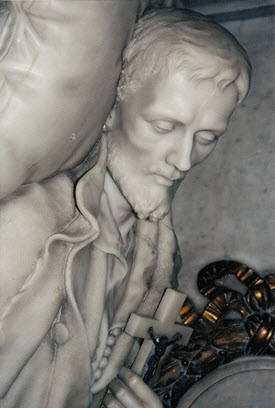 To date, there are no current books on the life of our patron. I hope to change that!
To date, there are no current books on the life of our patron. I hope to change that!
Every Wednesday (American Eastern Standard Time from 6pm to 7pm) my family and I adore our Lord in our local parish. This is when I will read each chapter and write my reflections. Perhaps you can join me now that we have live stream Adoration and we can be united in the hearts of Jesus, Mary and St. Benedict Joseph Labre.
The following are my on reflections on “The Life of Benedict Joseph Labre” which was originally written by his confessor Father Giuseppe Marconi in Italian and then later translated in English by Father James Barnard in 1785. This book was one of the main instruments used for his canonization process to begin.
I will offer one chapter per week as a reflection. Scroll down the page to find the most recent reflections.
Wednesday, October 25th, 2017
Preface
edited by Theresa Duff
Fr. Marconi was entrusted by the Bishop of Boulogne and by the Vatican to write an accurate account of the life of St. Benedict Joseph Labre, because he was the confessor of St. Benedict Joseph Labre.
The priest begins the book with this prayerful beginning: “Almighty God, Who alone does wonderful things. Who raises up the needy from the dust, and lifts up the poor from the dunghill, that he may sit with princes, and hold the throne of Glory, has vouchsafed in our days to raise up a poor man, who was born in France and known by the name of Benedict Joseph Labre, and in proportion to the obscurity of his life, has rendered him so much more illustrious after his death. And as we piously believe, has put him in possession of that blessed Kingdom promised to the poor in spirit, as a proof of which He exists Powers of His Right Hand and renews His Prodigees.”
Fr. Marconi references that: “all” of Italy has been surprised and astonished regarding the wonderful works Benedict Joseph Labre has brought to Rome, but also in “very distant places”, which were more and more manifest. These events became more prevalent than the virtuous humble life qualities of our saint.
According to Fr. Marconi, this was the main reason his superiors entrusted to him the writing of the book. Their intent was clear: To wipe out and dispel any sense of exaggerations and spiritual hysteria of un-truth about Benedict Joseph’s Life. Hence, this book attests to the authenticity and was used to pronounce St. Benedict Joseph’s holiness and his cause for Canonization.
Fr. Marconi’s knowledge of St. Benedict Joseph was like none other at the time and his book was written out of a sense of both affinity and duty. Great tasks were taken by the author to obtain authentic documentation of accurate life accounts which were submitted to Rome for Benedict Joseph’s Cause.
Ash Wednesday, February 14th, 2018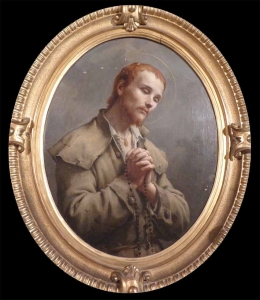
The Following Reflections are from the cited book (above)
by Timothy Duff, STM, MA Cert. CHL
Edited by Theresa Duff
Chapter One – The Birth of the Servant of God: His Infancy and Education
France was known as the elder daughter of the Church; Father Marconi praises France for inspiring so many holy people. In referring to this, he states: “we may now exalt on the increase of its glory by having produced so great a man as Benedict Joseph Labre. Through our patron’s life being concealed in the common people. The author uses the words, “contemptible veil of a poor, mean and abject life; at the moment of his death Benedict Joseph bursts from obscurity. Through a pronouncement of wonder from all countries and fixed on his tomb. He now has the attention of the whole Catholic world.” (Ch1. Paragragh 1) The author focuses on these so that the reader can build a lasting impression of piety and an affinity for Benedict Joseph Labre. It is commonly known the people from all over Europe and beyond traveled to Benedict Joseph’s funeral.
Demographics
- Born on March 26th, 1748, in the Diocese of Boulogne upon the Sea.
- Lived during the Pontificate of Pope Benedict XIV and in the reign of King Louis XIV of France
- His home church was the Parish of St. Suplice of Amette.
- His Father: John Baptist Labre. His mother: Anne Barbara Grandsie.
- Both of our patron’s parents were living when Fr. Marconi wrote the book.
- Their blessed marriage produced15 children- Benedict Joseph was the oldest.
- A strong patrimony allowed them to care for and raise the children appropriately with piety and a distinguished proper education.
Benedict Joseph’s father and mother offered a proper sense of gratitude to God for so many blessings. Benedict Joseph shared this mindset. His parents exposed their children to many grace-filled moments and brought them up in innocence and holiness. The family had a distinguished reputation for this in their day.
Benedict Joseph was baptized by his paternal uncle: Rev. Francis Joseph Labre, formerly the vicar and rector of the parish in the village of Erin (within the same diocese of Boulogne upon the Sea).The priest (who was also godfather) gave Benedict Joseph his name.
His uncle Fr. Francis oversaw the education of Benedict Joseph and our patron spent the greater part of his youth under his uncle’s formation and direction. Father Marconi mentions a “formation” of Benedict from his infancy and the example of his virtuous parents became an instant vehicle of grace for Benedict Joseph to lead an innocent and holy life. Benedict Joseph expressed his gratitude for this in a letter which he later wrote from Mont Reuil to his parents on October 2, 1769. A copy of the letter in its entirety follows the reflection.
Fr. Marconi describes young Benedict from the time of five as having a strong desire to read and write. He was gifted with a retentive memory, quick comprehension and good judgement. His demeanor was sweet and very docile. This disposition laid the groundwork for young Benedict to be open to a tender devotion which turned his first thoughts towards God. Even at this young age, Fr. Marconi accounts that the Holy Spirit moved the soul of our patron to a singular love of prayer. This was so much so that his parents shared how he had a disdain and dislike of childish amusements. Fr. Marconi explains further that the principle part of young Benedict’s character were the works of grace and not of the effect of his countenance. He then goes on to share how young Benedict began early to realize the war within the flesh between the passions and the soul. Benedict had a profound humility. He said Benedict was so well composed that these early virtues were hidden so as not to go noticed. Father Marconi states: “every assault of his passions convinced him that the life of a Christian in this world is a continual warfare, and that a soldier of Jesus Christ must never lay down his arms until the moment in which he is to receive his crown. From hence proceeded that courageous resolution which he formed in his infancy and which he and which he firmly adhered to of restraining the first motions of his natural passions and inclination, and of always corresponding with the grace of God, that in all things he might be entirely guided by the lights and motions of His Divine Spirit.“(Ch1. par. 5)
Young Benedict’s parents, neighbors, and others who cared for him from infancy all bore witness to these facts about St. Benedict Joseph Labre. They testified that he was observed to have a mild and even bashful temperament. Fr. Marconi said that those who studied his life and who tried to penetrate the real motives of his conduct concluded that in Benedict grace triumphed over nature. The humility of Benedict made him (under the appearance of simplicity) concealed the tensions in his interior conflicts and the merit of his victory over his natural inclinations.
The following is the letter St. Benedict Joseph Labre wrote to his parents after he left Sept Fons Trappist Abbey:
A verse from the “Miserere ” headed the letter. Ab iniquitate mea et a pec- cato meo munda me quoniam iniquitatem meam ego cognosco; Ab iniquitata mea et a peccato:
My very dear Father, and my very dear Mother,
I must tell you that the Carthusians have not found me suitable to their Order. I am, therefore, come out to-day, October 2nd. I take it as a command from Divine Providence. The Carthusians themselves told me that the hand of God is directing- this. I go on my way then towards la Trappe, the goal I have so long wished to reach. I ask your pardon for all the trouble I have caused you, and for my many acts of disobedience. I beg of you both to give me your blessing so that Our Lord may go with me. Every day of my life I shall pray for you. Do not be uneasy on my account. However, much I might have wished to remain in the monastery, they would not have consented to keep me, so I rejoice that the All-Powerful leads me. Be careful for the instruction of my brothers and sisters, especially of my god-child. With the grace of God I shall cost you nothing more, and I will give you no trouble. I com¬ mend myself to your prayers. I am well. I have given no money to the servant who takes this letter. Before leaving the monastery I received the sacraments. Let us always serve the good God and He will never forsake us. Take good care of your health. Do read and practise all that Plre l’Aveugle (P6re Lejeune) teaches. His book points the way to heaven, and if we are not guided by it, we cannot hope for salvation. Meditate upon the fearful pains of hell which are the penalty of a single mortal sin that we commit so easily. Strive to be among the small number of the elect. I thank you for all the goodness you have shown me, and for all the services you have rendered me. God will reward you for them. Try to give my brothers and sisters the education you have given me, it is a means to make them happy hereafter. Without instruction one cannot be saved. I have cost you much, but be assured that by God’s grace I will profit by all you have done for me. Do not be distressed because I have left the Carthusians, it is not lawful to resist the will of God, and He has thus disposed of me for my greater good, and for my salvation. Remember me to my brothers and sisters. Grant me your blessing. I will not give you any more pain. The good God whom I received before leaving the monastery will assist me, and guide me in the enterprise which is His own inspiration. I will always have the fear of God before my eyes, and His love in my heart. My strong hope is to be taken at la Trappe ; in any case I am assured the order at .Sept-Fonts is less severe, and that younger postulants are received, but I shall be received at la Trappe.
Your very humble Servant,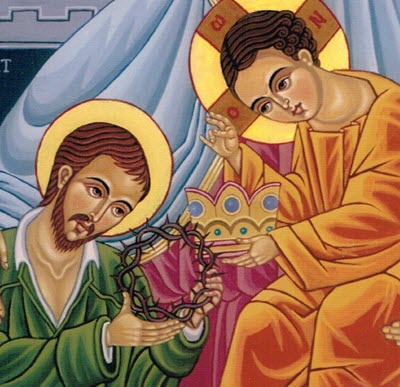
Benedict Joseph Labre.
Montreuil, October 2nd, 1769.
Letter Source:
Benedict Joseph Labre
Votary of Holy Poverty and Pilgrim
BY C. L. WHITE
LONDON : BURNS & OATES, Limited
NEW YORK, CINCINNATI, CHICAGO : BENZIGER BROTHERS 1906
Prayer After This Week's Reflection
by Anne Costa
Dear Lord,
We pray to you and for the intercession of our dear patron St. Benedict Joseph Labre to always be open and docile to your ways and the teachings of our holy Church. May the Holy Spirit be our comfort, counselor, and guide.
May we follow the example of St. Benedict Joseph Labre by growing in humility, seeking a life of virtue and trusting in the loving providence of God, our Father.
Help us to grow in confidence in God's mercy and care and to bear our burdens and suffering with the same joyous resolve displayed by our patron and friend.
Amen.
Anne Costa is a wife mom and grandmom, the author of six books for Catholic readers and an inspirational speaker. She is currently working with the John Paul II Center for Women and delivers Spiritual Boot Camp - Catholic Mom Edition...power-packed videos to encourage and affirm Moms to help them stay fit for the Kingdom and strong in their faith. Anne lives with a mental illness and is an advocate and friend of those who do the same.
Wednesday, February 28th - Second Week of Lent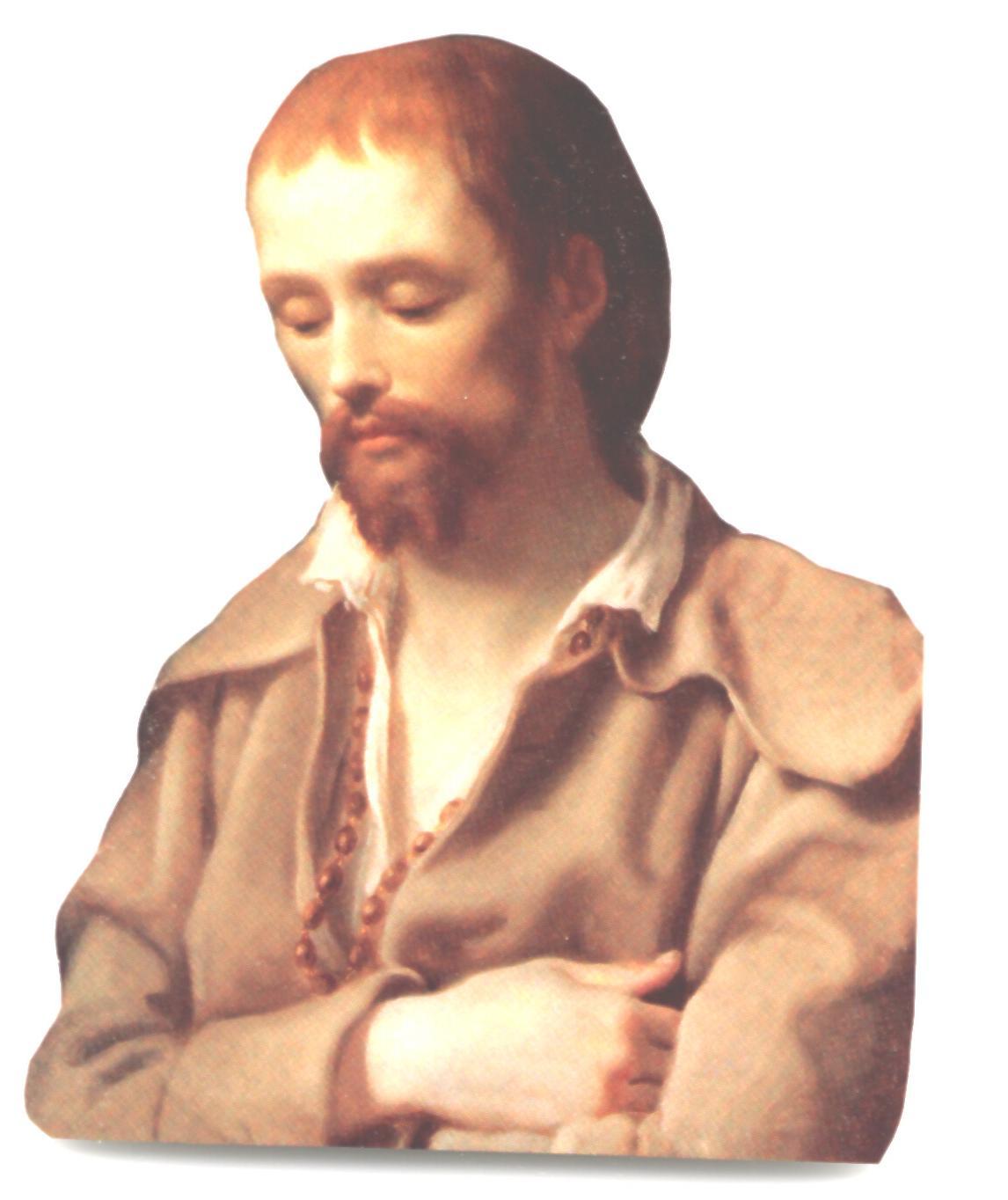
Chapter 2- The Employments of the Son of God in his infancy
Chapter two of the book is spiritually rich in its content and only the first two paragraphs of the chapter were used for this reflection.
edited by Theresa Duff
Fr. Marconi begins by pointing out that when God calls specific souls to the heights of holiness, their infancy is a foreshadowing of what their mature adult life will be like. He notes that it is especially through Divine Providence that this takes place. Through little Benedict Joseph: "we are furnished with a new proof of this truth in the life of Benedict."
From the age of five, the author points out that Benedict Joseph began to practice virtuous acts that would, "make his soul a most perfect model and a copy of that of Our Divine Savior, Jesus Christ." Fr, Marconi quickly begins to speak of the profound spirituality Benedict Joseph would embrace throughout his life - someone who embraces Jesus Christ and who tries to imitate him must have a triple heart. Fr Marconi explains that this person: " ought to have, in some manner, three hearts founded upon, proceeding from, and concentrated in one; that is to say, one for God, another for his neighbor, and a third for himself." (par.1)
Father Marconi states the Benedict said that "the second heart must be faithful, generous and full of love and inflamed with love for our neighbor" We must be always ready to serve him; being always concerned for the soul of our neighbor. He again turns to the words of Benedict: "employed in sighs and prayers for the conversion of sinners and for the relief of the faithful departed." (The souls in purgatory.) The third heart, Benedict said: "must be steady in its first resolutions, austere, mortified, zealous & courageous, continually offering itself in sacrifice to God." (par.2)
This is the heart of a Christian according to our patron. Fr. Marconi reiterates Benedict sentiments not to allow passion or sinful inclinations to distract or dissuade us from the goal, He encourages us to live a life of self-denial while always focusing on eternal life. Benedict says: "our happiness in the next life will be proportionate to our contempt of this earthly existence and the courage with which he has kept it nailed to the cross.
"Benedict said these three hearts (or affections) need to be united as to make only one- being amiable to all, a friend of true humility...whoever builds upon any other foundation than humility builds on sand." (par. 2)
Prayer After This Week's Reflection
by Anne Costa
Heavenly Father,
We seek from you the grace to embrace the virtues of our Patron Benedict
Joseph, who from the very beginning of his blessed life, reflected three hearts in one of
a love for God, neighbor and oneself. We pray for a pure heart that is devoted
to you, undivided in affection and attachment; for a humble heart that is steeped in concern
for the salvation of others; and finally, we implore you to prepare our hearts each day to
"be steady in our first resolutions, austere, mortified, zealous and courageous,
continually offering ourselves in sacrifice to You."
Lord, lead us along the little way of the three hearts as we seek to be as simple and trusting as
St. Benedict Joseph who walked in your loving ways and grew in holiness all the days of his life. Amen.
March 28th Passion Week 2018- Spy Wednesday
Completion of Chapter 2- The Employments of the Servant of God in his Infancy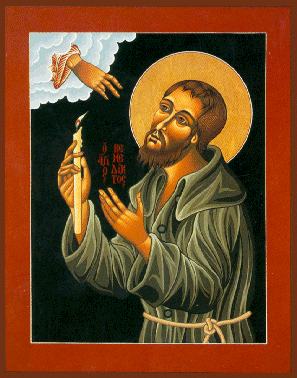
edited by Theresa Duff
As Little Benedict Joseph grew in age, so did his Wisdom of God and practice of virtue. Fr. Marconi attests that rather than the usual childhood play, “he would make little oratories”. There were profound prayer gestures. Fr Marconi also says that these were an intuition of his future. The word in the book is “presage”. This caused Benedict to desire great devotion and desire to serve the priest at the Altar during Mass. His parents testified that his heart was constantly filled with this desire.
Another profound virtue that was noticed in little Benedict Joseph was his devotion to the sacred churches. Townspeople were so edified by him that most of them would show up at Mass in order to get a glimpse at little Benedict Joseph serving at the Altar in such a mystifying and devout manner. Fr. Marconi says that at a very young age little Benedict Joseph’s heart was fixed on the Sacred Mysteries. He also states: “he never entered into them but with such a degree of reverence as afforded edification to every beholder.” (Paragraph 3) Such profound language is used here that it must be quoted: “When a soul is free from every earthly affection and full of God, Whom the liveliness of its faith represents as being in a state of immolation upon the altars, when a soul is truly sensible of and truly grateful for all His favors, where can such a soul experience more celestial sweetness than in the temples and before the holy altars.” (paragraph 3)
Fr. Marconi stated many people witnessed that not only did little Benedict Joseph have an edifying presence while serving Mass, that he also sought instruction in the faith in the same way. He was always filled “with a holy eagerness and was desired to hear, read and meditate on the Word of God” (paragraph 4)
At that time, on most Sundays, people engaged in all sorts of recreations throughout the day. Fr Marconi stated that little Benedict would attend such things out of obedience to his parents. The author emphasizes a second time that he had no inclination or relish in such things. Little Benedict Joseph would often leave them to hang with adults in order to have a more serious conversation. Fr. Marconi mentions here how most children follow their childhood imaginations and play- but not little Benedict Joseph.
Fr. Marconi then passes moral critique of Benedict Joseph at this early stage of development. He attests that these movements of the saint to leave children’s play and the like are not from a “melancholic temperament” but are from an exalted and pure motive of the heart. The author further embellishes on this point by saying that whenever it was out of obedience or civic duty, little Benedict Joseph would have a good graceful way about him and engage in “innocent diversions.” His uncle M. Vincent testified he was “always contented with his companions and cheerful in his recreations.”
Fr. Marconi declares that this is only attributed to God and that little Benedict Joseph was called to such a state of perfection: “Learn of Me, for I am Meek and Humble of Heart.”
At the same time, the Holy Spirit was at work by moving our saint to contemplation at an early age. He began to love solitude and silence. According to Fr. Marconi, Benedict Joseph became happier and more content in his soul to follow his vocation. The more he practiced these things, the happier he became. Yet, he remained open and docile, and he was a pleasure to be around, so much so that he attracted other children and adults to himself.
Fr. Marconi says that his childhood terminated earlier in the development of Benedict Joseph than in most children. His love of reading and study grew in proportion to his desire for solitude and contemplation. He began to distaste worldly childhood things and began to move towards penance, sacrifice, and self-contempt. (Keep in mind our saint at this stage is not quite seven years old) The author concludes by stating that he always put the obedience of his parents first. “During the whole course of his life, he never departed from the abdication of all earthly things, which he had resolved on and practiced from his tender age. But this which was, in his infancy, a kind of novitiate to that state of evangelical poverty which he practiced with so much rigor during the rest of his life, was at that time looked upon only as an effect of natural bashfulness.”
Prayer After This Week's Reflection
by Anne Costa
Dear Lord in heaven, we are blessed by the example of young Saint-in-the-making Benedict Joseph Labre who displayed such joy and reverence beyond his years. May he inspire in us a likewise holy eagerness and purity of heart.
St. Benedict Joseph Labre, intercede for us to grow in detachment from the things of this world that distract and disturb us so that we might be filled like you were, with a heavenly gaze and peace of heart.
Thank you, Jesus, for the hope you inspire and the help we receive from our Patron Saint Benedict Joseph. Amen.
Wednesday, May 23rd, 2018
Chapter 3- His First Studies
edited by Anne Costa
Chapter three, which is short, highlights the desires and virtues taking hold in Benedict Joseph at the age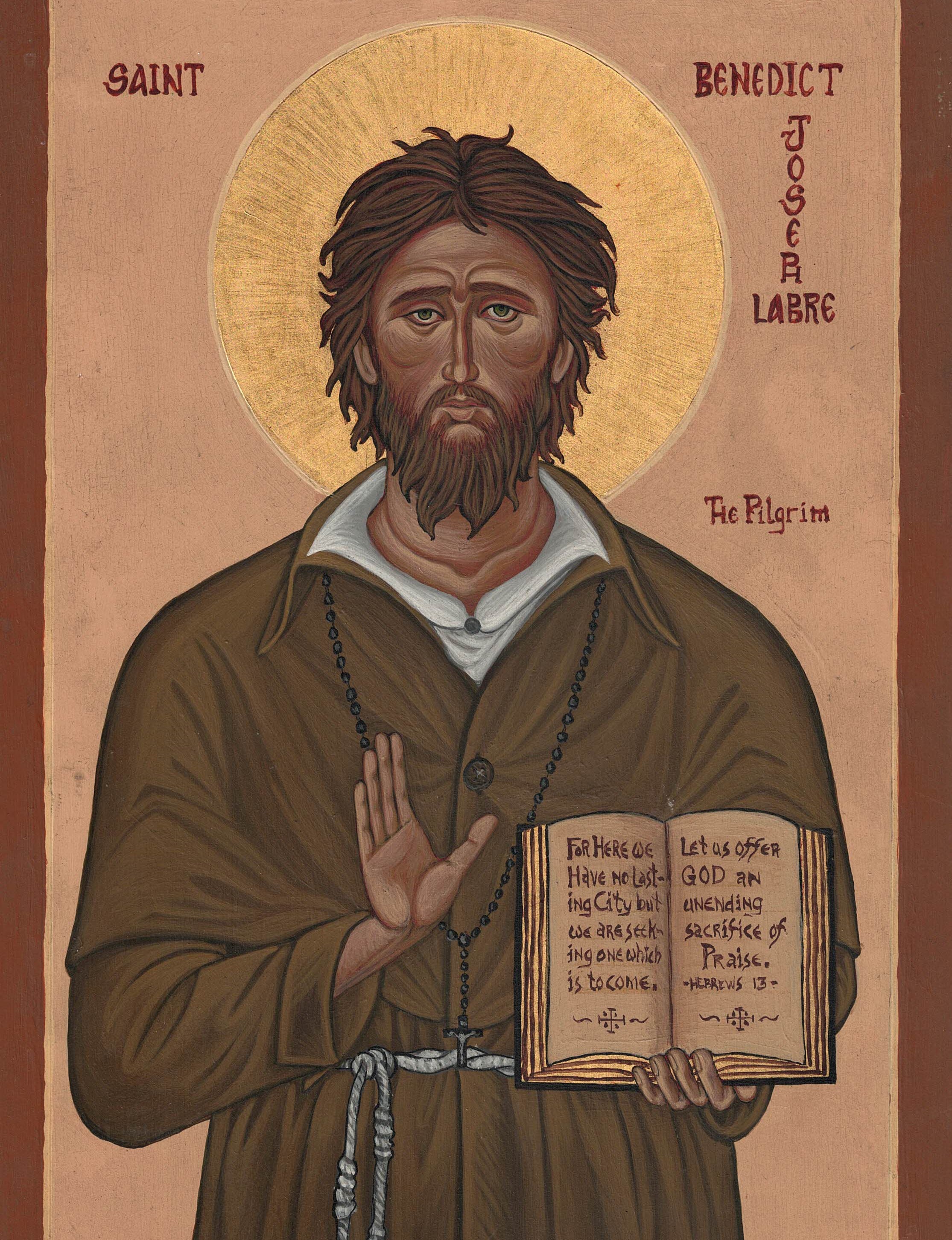 of seven. When he was five, his parents, seeing the good nature of their son, sent him to the school in their town of Ammette. The Church pastor, Msgr. Hanotel, also was the keeper of the school. The author, Fr. Marconi states: “If Benedict was a model of religion and piety to the children with whom he was educated, he set then an equal and edifying example of docility and assiduity in the discharge of all of his duties proper to a person of his age.” (Ch3, Paragraph 1)
of seven. When he was five, his parents, seeing the good nature of their son, sent him to the school in their town of Ammette. The Church pastor, Msgr. Hanotel, also was the keeper of the school. The author, Fr. Marconi states: “If Benedict was a model of religion and piety to the children with whom he was educated, he set then an equal and edifying example of docility and assiduity in the discharge of all of his duties proper to a person of his age.” (Ch3, Paragraph 1)
Msgr. Hanotel wrote a declarative statement about Benedict Joseph validating all of his extra-ordinary dispositions and virtues of the young man. The letter states that for twenty-eight years of further pastoring of the school, the priest never forgot about Benedict Joseph, so much so, that he often inquired about him throughout much of that time. Msgr. Hanotel admitted that he always knew some great goodness would come from Benedict Joseph’s life. The chapter concludes by offering another declarative statement made by Msgr. Hanotel’s servant, Francis Forgeois. He said: “This child distinguished himself above all others of his age in modesty, piety, docility, meekness, etc. He never said anything to offer his master question.” He closes his statement by saying that he was so well satisfied with his conduct that he didn’t remember Benedict Joseph saying or doing anything that might grieve him. Fr. Marconi vociferously shared the statements of these witnesses. He reiterated these sentiments by explaining how Benedict Joseph was honored by our Divine Master with these special God-given graces toward love and recollection., citing “a remarkable disengagement of his heart from all earthly engagements.” Fr. Marconi closes chapter three with a short reflection on the Church.
He reminds us that God raises saints like Benedict Joseph early in his life in order to awaken our faith. He explained, “ in all probability, the reason why God imparted to Benedict while he was yet an infant such extraordinary graces, was that, by new examples capable of arousing our drowsy faith, He might convince us that His Church, which is always holy, will never cease to have saints in every age, every condition and state in life.”
icon image-
The image of St. Benedict Joseph Labre is the actual Icon from the late Little Brother's of St. Francis
who were a small Franciscan community in Roxbury Mass for thirty years.
The Founder passed away and the order no longer exists. The image was in their little chapel named after our patron.
They personally prayed for us since 1996 and became our close friends. Br. James will not forget you!.
Prayer After This Week's Reflection
by Anne Costa
Oh, Divine Master, we are indebted to you for the holy example of St. Benedict Joseph Labre. He consented to be filled and motivated by your love at an early age, seeking to do your will throughout his life. Let us follow his example, humbly and with great meekness and dependence on You who is the source of our grace and consolation. Amen.
Wednesday, August 15th, 2018
First reflection from Chapter 4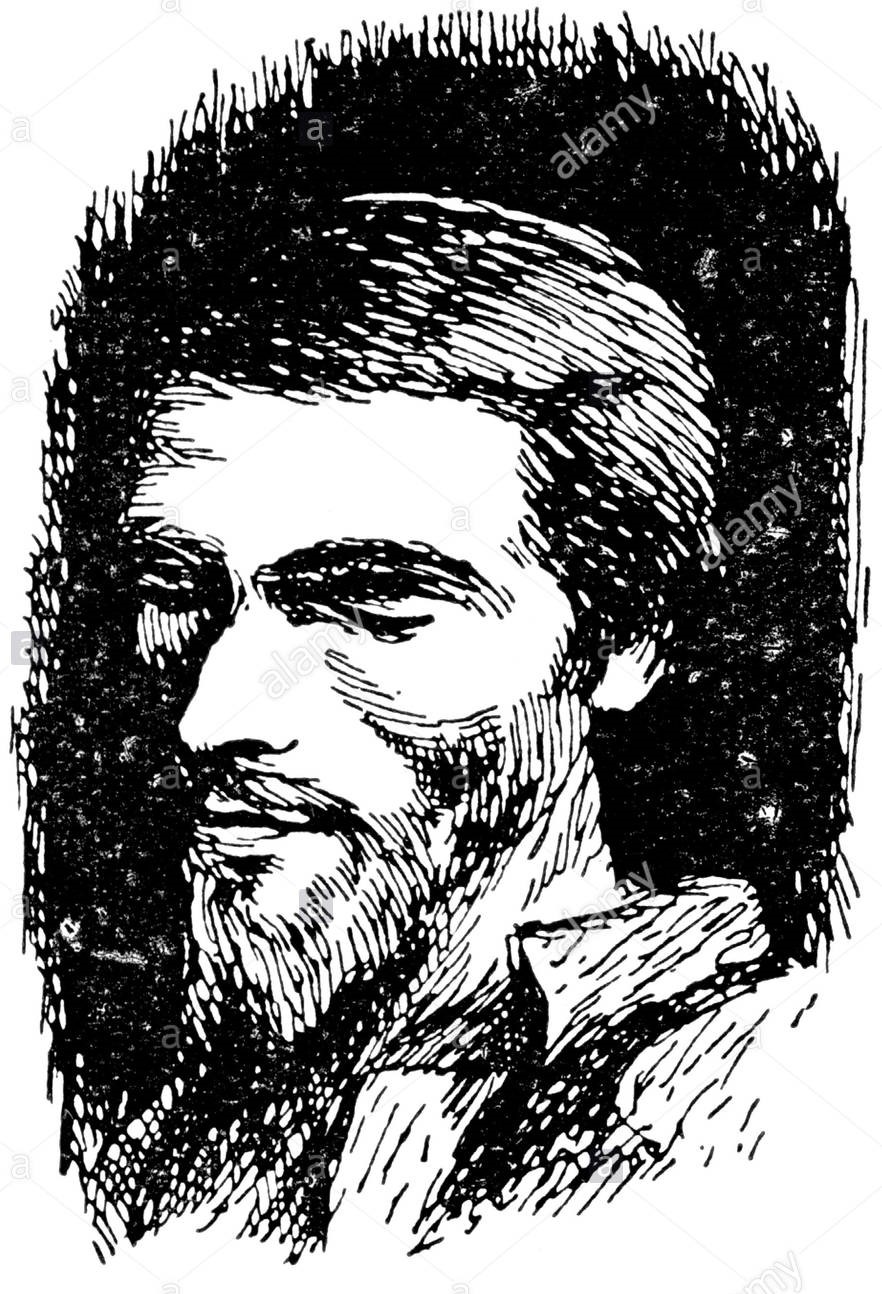
Chapter 4- An Account of the Youth of Benedict; his Conduct Under the Direction of His Uncle- He Makes his First Communion
The Chapter begins with Fr. Marconi describing the transition of Benedict Joseph in his infancy to that of his youth. The confessor draws an analogous comparison to that of St. Malachias which is described in a eulogy by St. Bernard who states:
The youth of St. Malachias was entirely a piece of his infancy. He preserved the same purity, simplicity, the same innocence of morals. The only difference that could be observed in him in those two different stages of his life was that in his youth he entertained a still greater desire to grow in wisdom and in grace…He took upon himself certain particular devotions and observances, and by his means raised himself to a degree of virtue and holiness to which it was difficult for others to attain. P1
According to Fr. Marconi, there is a universality in the making and development of saints. He calls it “The Same Divine Spirit”. The fruits of the grace given may differ from person to person in lieu of the particular age and states of the soul when a person is called to sainthood. He recalls, that the source, “the foundation and substance is the same in all.” P2 Father Marconi goes on to state that by a particular disposition of Divine Grace some are called in the first instances of their life to holiness. These persevere, hear their vocation and follow it. P2
There were multiple testimonies from the time of our saint that show this to be the case of our Benedict Joseph. Fr. Marconi states this was especially true of Benedict’s parents. His parents declared:
He gave them constant proofs of his sincere piety by his assisting at the Divine Offices and instruction with a degree of attention and reverence tuly edifying; of wisdom and prudence, of never saying or doing anything unbecoming, of obedience, by always doing what he was ordered, with cheerfulness and alacrity, of peacefulness, in always behaving towards his mother, his father, his brothers and sisters in such a manner as never to give them any occasion of uneasiness or offence…A disposition, adds his parents, as to make this child most dear and amiable to them, as he likewise was to everyone he knew. P3
Possessing these qualities, moves his parents to decide to formally educate Benedict for the priesthood. Now at the age of 12, his parents work things out with his uncle (the priest) that he prepares for his first communion. Benedict can hardly contain himself at this news: “his soul was filled with sentiments of joy, of love, of humility and of a holy fear.” The saint himself had obviously been preparing for this major spiritual event in his young life. He was filled with a desire to make his first general confession. (Keep in mind that Benedict Joseph maintained his baptismal innocence throughout his life.)
Fr. Marconi was moved by Benedict’s preparation and it is worthy to account: “This would be the first of five or six general confessions he would make throughout his lifetime. The venerable Benedict, being persuaded that, without the grace of God we can do nothing, not even discover our own faults, so as to view them in that light in which we ought to consider them, first implored the light of the Holy Ghost and besought Him not only to bring to his remembrance his sins with all of their different circumstances, but likewise to discover to him the true state of his soul, his bias and inclinations.” P5
St. Benedict Joseph’s Format for making a General Confession
- He proceeds to state each Commandment and their corresponding virtues; he is examining his life from the time he made his last confession examining and comparing his life: all his actions from the time he had made his last confession.
- He divided his life into many segments, carefully comparing them to the particular virtues of each commandment.
- He took special note not to judge himself “This he considered as the province and privilege of the minister of Jesus Christ,”
- He explained what temptations he had experienced and how he behaved under them.
- He explained what special graces God had given him and in what particular manner he had responded to them.
St. Benedict Joseph’s Attitude of Prayer after making the General Confession
- He offered a fervent prayer to God asking for a true contrition of heart
- He made a serious consideration of all of the motives which faith suggests to move his self to it.
- “Above all, he endeavored to excite in his soul a sorrow for his sins.” This allowed him to take on an attitude of penance.
Notes: There are no childhood representations of our saint. The next reflection will start on Benedict’s particular understanding of sin.
Prayer After This Week's Reflection
by Anne Costa
Dear Lord,
The example of St. Benedict Joseph's youth is a sweet reminder of how we are to completely entrust ourselves to your perfect care. He depended on you for everything and received many graces to exercise virtues that were pleasing to you and those who knew him. Thank you, Lord, for your direction, your judgment, and your unending mercy. Help us to approach you in confession with the same confidence and contrition of heart that St. Benedict Joseph displayed.
Amen.
Wednesday, August 22th Second Reflection from Chapter 4
 An Account of the Youth of Benedict; his Conduct Under the Direction of His Uncle- He Makes his First Communion
An Account of the Youth of Benedict; his Conduct Under the Direction of His Uncle- He Makes his First Communion
Benedict Joseph offered to his confessor a first general confession at the young age of 12 years. God gave him a profound and sensitive understanding of the meaning of sin. Fr. Marconi says it best:
Above all, he endeavored to excite his soul for a sorrow for sin, founded on those motives which render it perfect contrition, by considering sin as an ingratitude committed against God, a disobedience to His law, and an outrage offered to His infinite and essential sanctity. In his accusation of himself, he preserved order, clearness, humility, precision, and sincerity to an admirable degree. P8
From this profound sensitively also grew his respect for the Catholic priesthood and reverence for the confessor acting in persona Christi (the person of Christ). Benedict’s reverence was so edifying that Fr. Marconi uses words referring to that confessional moment: “After he listened to the words of his confessor with very great respect… venerating his words as oracles sent from heaven.” P9
Benedict’s piety and devotion to the love of God were again apparent. Listen to how Fr Marconi ends the account our saint’s reception of absolution:
“Before receiving, he knelt down and humbly bowing his head, he renewed his sorrow for his sins, and endeavored to excite in his soul a most lively act of contrition, after which he modestly raised his head, to give his confessor to understand that he was ready to receive absolution.” P9
Benedict’s admitted to Fr. Marconi (at 12 years old) that he learned from St Teresa of Avila that: “a multitude of sinners plunge themselves into eternal miseries by making sacrilegious confessions.” P 10
Benedict’s Mystical Vision of Penitents
He offers a reflection to Fr. Marconi on confession. Benedict tells Fr Marconi that he distinguishes people going to confession into three classes: He names them the perfect penitents and the false penitents. Benedict then confides in Fr. Marconi that they appear to him in three processions or lines of people and each takes a different road.
The first class of people who were composed of a very few were the perfect penitents. “Having probed the wounds of their souls to the bottom", had manifested them with sincerity and obtained a sincere sorrow. These people had truly penitential tears. These had achieved true contrition by appeasing the divine justice by their fasts, their prayers, and alms. Benedict looked at them as holy penitents and described them to Fr. Marconi as: being clothed with a white and luminous robe, who in the moment of their death are carried to heaven and enter in triumph into the eternal tabernacles of the Living God.” P10
According to Benedict, the second class of people he saw, were still very few in number and were called the imperfect penitents. Their garments, Benedict says, “were tarnished with a red color”. Therese people fully complied with the conditions necessary for a good confession but had not done enough penance. They relied too much on the pardon they obtained. Therefore, these people had very little zeal in performing their prescribed penance attached to the confession; he mentions that they also neglected taking advantage of the many indulgences offered by Holy Mother Church. Thus, not satisfying the Divine Justice for their sins. Benedict said, “heaven remains shut against their desires to enter, and they are pushed back towards Purgatory, to complete the satisfaction which Divine Justice demands, and to be purified from everything which has defiled their souls.” P11
Benedict recalled the third class of people from his vision and named them the false penitents. He said they were far more numerous than the two other classes of penitents. These appeared to him as clothed with smelly and dirty garments. These penitents were negligent in their examination of conscience, by being destitute of a true contrition or a firm purpose of amendment. Benedict also says that those in this class: “were both overcome by a wretched fear and shame, willfully concealed any part of their sins and by that means, defiled their souls.” P12 These poor souls appeared to him as sacrilegious hypocrites, who go to hell by the very road which ought and was intended to lead them to heaven.
Fr Marconi says that this vision was so moving for Benedict that it imprinted on his mind and heart a dread and horror of sin. The was one of the graces God used to preserve Benedict’s innocence against temptation and to allow him to reap the full benefit of the Sacrament of Reconciliation.
Prayer After This Week's Reflection
by Anne Costa
Heavenly Father,
Let us seek to approach you in the Sacrament of Reconciliation with hearts as pure and trusting as St. Benedict. Your mercy is everlasting, but we must humble ourselves to receive it.
St. Benedict instructs and informs us, may he also intercede for us at the throne of your grace,
Amen.
Wednesday, October 31st, 2018 Chapter 5
Sentiments of Esteem Which the Uncle and the Schoolfellows of the Servant of God Entertained for Him
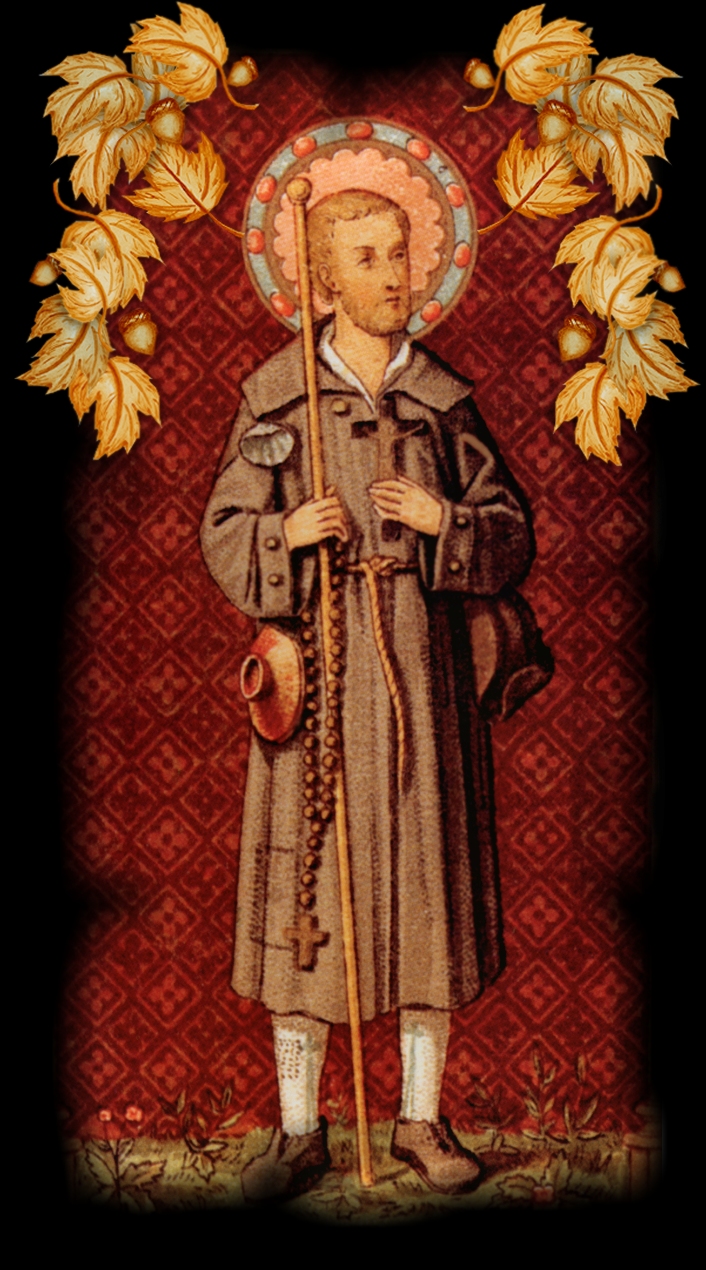
The pastor of Erin, Msgr. Emadon shared that the other children paid as much respect for Benedict as they did their teachers. Fr. Marconi states it is because of the saint’s piety.
He goes on to name three teachers who witnessed Benedict directing and severely reprimanding them when he saw his peers doing something improper and contrary to the commandments. The words used to describe Benedict in this way were that he was always pious, modest and devout. They further stated that when he was in prayer at the Divine Office, they would rarely see him move. His peers reported that at lunch break, Benedict was rarely seen eating; he would give his lunch to some poor person by handing it out the school window.
Benedict was always seen walking with a book in his hand. He would be reading that the spiritual works from the library the whole time while living with his uncle who was the pastor of Erin.
St. Benedict’s prayer life was very much in union with the Divine Will. Most of his readings were of sermons from a famous priest at the time known for his preaching on morality and hell. This moved Benedict to always seek what Divine Providence was asking of him. Fr Marconi states that fear and love is what moved him. Benedict was fourteen years old at this time.
Benedict Joseph had an inclination towards peace and solitude. The Spirit led him to an ardent desire for frequent reception of the sacraments. Father Marconi states: “ the signs of his vocation to this state appeared more certain, in as much for several years he had exercised himself in the constant practice of poverty, humility and penance.” P5 In short, Benedict’s way of life that was calling him towards a religious vocation.
Benedict’s heart was moving him towards the religious community of La Trappe which was the strictest order in the Church at that time. They had a reputation for living out the virtues. This community followed the original rule of St. Bernard who lived in the twelfth century.
When Benedict asked his uncle, he was encouraged to seek permission from his parents. The saint then turned to God and spent much time in prayer and discernment. He knew this would be a difficult thing to ask. He was the oldest of the 15 children and was the rightful heir to his parents’ estate and it was customarily known that it would be his responsibility to take care of the family and their possessions after his parents. Benedict’s family would be by today’s standards upper-middle class, so the responsibilities would be many.
Benedict made the trip to his parent’s home to deliver his question to them. The words Fr Marconi said his mother was shocked. The vehemently opposed and refused his request.
They wanted the esteem of him becoming a pastor like so many already on both sides of their family. “The humble young man considered their refusal as one of the trials which Divine Providence was pleased to make of his virtue. His ready obedience forbade every rumor, re returned to his uncle to put himself again under his direction, and resolved, redoubling his fervor, to endeavor to obtain of God that he would one day accept of the sacrifice and dedication of himself which he was held to make to His Divine Service.” P6
Prayer After This Week's Reflection
by Anne Costa
St. Benedict Joseph, intercede for us in times of doubt and temptation. Your example of simple piety, devotion and trust can help us in our every day lives. May our hearts be filled as yours was with humility and love and a desire to follow Jesus always. Amen.
Wednesday, November 20th, 2018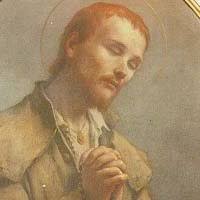
Chapter 6
The Servant of God returns to the parish of Erin, where he remains ‘til the year 1766
Benedict Joseph returns to the parish of Erin again after receiving a refusal from his parents: not allowing him to follow his heart to the monastery at La Trappe. Fr Marconi states:
It sometimes happens that disappointments and contradictions weaken a man’s resolutions and cast him into despondency. But that which Benedict experienced by his parents…contributed to redouble his fervor, and inspire him with a greater attachment to his duties, a greater love for prayer and for the reading of good books...a greater desire of uniting his soul more closely to God by a frequent participation of the holy sacraments. P 1
The parish of Erin was like a monastery for Benedict Joseph. His saintly uncle lived in a similar fashion as a consecrated religious. Fr. Marconi commented on how our saint took every opportunity to live like a religious. Religious piety, silence as in a cloister, regimented prayer schedule and all the regular practices of a religious community could be observed in the parish house at Erin. Most particular, the author comments, was the practice of all of the regular Church fasts observed between both the uncle priest and Benedict Joseph. He was not yet twenty-one and not obliged by Church law to practice them. However, he did them anyway. Benedict Joseph was on his way to great holiness and contemplation in in his heart getting ready to become a consecrated religious monk.
The two of them lived this way for two and half years before tragedy struck the town and parish of Erin. A cruel epidemic hit hard and every household was affected. Many of the people lay sick and dying. The virtuous uncle and nephew worked side by side caring for the parish family. Fr. Marconi recounts that they labored tirelessly into the nights offering pastoral support and service to their parish family members.
Benedict Joseph knew that the men relied so much on the cattle and other farm animals; If lost, it would be detrimental to their sustainable well-being and to their family. He went on spending long hours caring for the farm animals and cleaning the stables of those who were not well enough to do so. The uncle-priest on the other hand, offered pastoral support to the sick and dying tirelessly putting himself in harms way paying no mind to whether he could get the disease himself. Benedict Joseph would also assist him. Fr. Marconi shares another perspective of what was about to happen next:
So great charity is never exercised without meeting with a proper reward. God, who keeps an account of every cup of cold water given in alms for His sake, without doubt, will never forget it. But how different are the Thoughts of God, and how much more exalted than the thoughts of man! The world sometimes gives wealth or titles of honor as the reward of past services, but God frequently sends to His friends new crosses as the recompense of what they have already done or suffered for His sake. P 5
Fr Marconi tells us that the good pastor poured out all of his strength in charity for love of neighbor and eventually succumbed to the pestilence due to his weakness and over extending himself so much that his body just gave out. His death could have devastated Benedict Joseph who was still a very young man. However, listen to what Fr Marconi says:
What a stroke was this for Benedict, and in what a situation was he left. God had deprived him of a master, a patron; a second father. In his house he found a reteat, which in a great measure alleviated the regret he experienced at finding the monastery shut against him by his parents refusing their consent. But the death of his uncle left him almost without support, and seemed to be a presage of new obstacles to the following of his vocation. The servant of God saw the whole event of his loss. Nevertheless, his courage increased with his confidence in God, and the Holy Ghost, speaking interiorly to his soul, gave him to understand that a Christian is never stronger than when he has no reliance but on God alone. P 7
Our patron, fueled by ardent charity, was evermore purified by the pain of the loss of his beloved uncle. It gave him an even greater occasion to cling to Christ and find solace in the Sacraments. May we find comfort in knowing that the same God in whom Benedict Joseph found refuge is just as near to us today.
Prayer After This Week's Reflection
by Anne Costa
Heavenly Father, we all experience the loss of loved ones and need your strength and love to fill the void. Please comfort us and carry us in these times. May we follow in the footsteps of dear Benedict Joseph who was so filled with love for you and his neighbor, that even in deep pain, he sought solace in the Sacraments and carried on in your name. Amen.
Wednesday, January 9th, 2019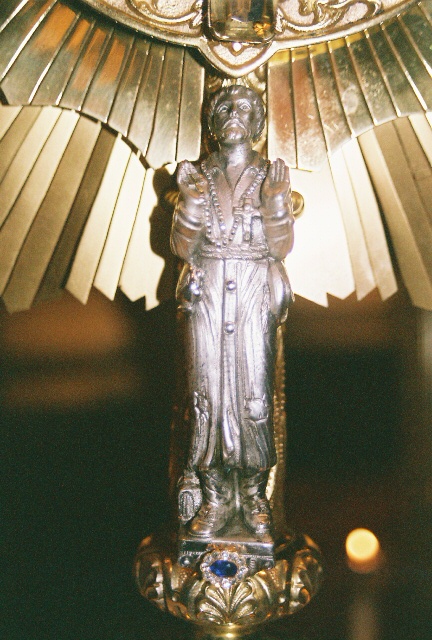
Chapter 7 First Reflection- The Death of His Uncle
He Returns Again to his Parents, and Again Endeavors to Obtain Their Consent for him to go to La Trappe
Now that we return to ordinary time in the new year of 2019, it is time once again to reflect on the life of our patron.
The death of Benedict Joseph’s uncle (pastor of Erin) left an impressible mark on his spirit. Death can certainly do that. The event is a moment of grace not only for the person who dies, but also for those left behind who had a close relationship with the deceased. Fr Marconi comments: “It is in this school of death that true Christians are formed to virtue…God immediately becomes the only object of his desires.” P1
For Benedict Joseph, this was a spiritual experience. The death of his uncle pushed him into a more contemplative and pious state. Fr Marconi recalls that these reflections gave our saint a stronger desire for solitude. The vocation to religious life became first and foremost in his mind and heart: “ He increased the number of prayers and doubled his fervor in his devotions, and by the practice of penance and in particular, mortifications, he laid deep the foundation of that life poverty, austerity, and self-denial which he afterwards carried to so great a degree of perfection.” P2
At this time, Benedict Joseph petitioned his confessor (the author) to hear another general confession. Fr Marconi recounts that it was this state of mind that rendered Benedict Joseph more ready to live the religious life.
Immediately afterwards, he petitioned his parents once again for their consent to leave for the monastery at La Trappe. However, he met with more of a repulse this time than in the past. Not only his mother but also his whole family was now against his decision. Benedict Joseph continued his penance and prayer and waited for Divine Providence to answer.
His family observed his penances and prayer and they were moved with compassion. At last, he won out and his parents consented. Our saint was filled with peace and consolation at last. What a treck he would soon make.The eighteen year-old Benedict Joseph had to walk across the French Alps to reach the monastery of La Trappe. He was resolved and showed more firmness and resolution for his vocation. The long deadly trip increased his zeal and determination to visit the holy place. What would happen to our saint?
Fr Marconi states: “He now thought himself secure of the object of his wishes, but here he found a new trial of his virtue, where he has hoped to have found a place of rest and repose.” P4
Just recently the monastery has lost quite a few of its members due to the religious state of their rigorous way of life. The Abbot, with the advice of others, had just paced a rule at La Trappe that there woud be no more admissions to the monastery unless candidates were already formed and proved capable of conforming to their rule and strict way of life.
When they saw our saint and now, how feeble and sickly he was currently, due to his long journey, along with severe penances he had been practicing, they did not accept him.
Fr. Marconi reiterated that the regret of the experiences could not be expressed properly. St. Benedict Joseph was devastated but he bore it with the patience and resignation which gave him the grace to grow in holiness. Fr. Marconi calls him a “true Christian” when referring to our patron at this time and states: “He immediately returned again to his father’s house, to wait with submission to the decrees of Divine Providence for a more favorable time to put his project into execution.” P5 One could imagine the state of Benedict's health once returning home yet once again.
Prayer After This Week's Reflection
by Anne Costa
Heavenly Father, give us the grace to grow in holiness in the same way that you equipped our Saint Benedict Joseph. Help us to bear our disappointments
as he did, with total trust in your divine providence. When we are filled with anxiety or fearful of the unknown. let us remember that you will come to our
aid to sooth our hearts and quiet our minds. Jesus, we trust in you. Amen.
Wednesday January 16th
Chapter 7 (part 2)
He Returns Again to his Parents, and Again Endeavors to Obtain Their Consent for him to go to La Trappe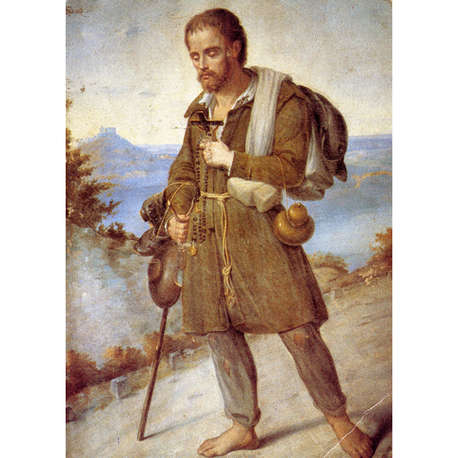
St. Benedict Joseph returned home after the loss of his uncle. Once again, in his reflections he was discerning a plan for his religious life. He felt driven and was convinced God was calling him. He just didn’t know how to approach his parents yet a third time to request permission.
In the meantime, he had another uncle, Vincent, who came calling and who was a monsignor at a parish in the town called Counteville. His parents decided to send him after the priest expressed great interest in continuing Benedict Joseph’s education for the priesthood. God’s Providence was setting the stage for something great in the life of Benedict Joseph. The two: the saintly uncle and the pious Benedict Joseph really came to love one another deeply and inspire each other.
The bishop of Boulogne wrote a letter to Fr Marconi in 1783 (the year of our saint’s death) regarding Benedict Joseph’s uncle, Monsignor Vincent who had a reputation for possessing a great disposition, prayer-life and love of the poor. It is worthy to take note:
“Sir, among the letters which I sent to you, there is one M. Vincent, the uncle of the venerable Benedict Joseph Labre. His testimony ought to make so much the more impression, as he is one of the most worthy priests that I know. His extraordinary piety, his austere life, and compassionate charity for the poor, has gained him the esteem and veneration of the public to such a degree that in the places where he is known, he is already canonized by the voice of the people, for they commonly call him, not Mr. Vincent, but St. Vincent.” From the Bishop of Boulogne’s letter of June 18, 1783” P6
As Fr Marconi was doing his research and preparing to write his book, Monsignor Vincent sent him an affidavit regarding the saint. In it, He tells the story of the peaceful countenance of our saint even in the midst of adversity and attack: “Benedict Joseph", 'says he', "rendered himself amiable from his most tender years, on account of his great mildness, of which he has on many occasions given signal proofs at Counteville, amongst some students whom I then taught. There was one, a very turbulent youth, who knowing him to be of a peaceful disposition, uses to make it his diversion to thwart and mortify him, but Benedict never resisted him, either by words or actions. He has exercised his patience so far as that, rather than to resist or make any complaints against him, he has suffered himself to be very much annoyed with the cold in winter. ‘I have observed in Benedict a great deal of piety and inclination to read good books. The works of Pere’ L’ Aveugle have given him his inclination, and this ardent desire of leading penitential life. He has read them several times, and as he had aa sound judgement and a good memory, he has imprinted in his soul the truths which he took notice of in these books”. P7
Benedict Joseph drawn more to this reading from the missionaries was drawn now to follow the preachers as they would come to the diocesan parishes. He would now make little journey’s to listen to these holy men. Benedict Joseph was occupied with holy thoughts all of the time. Father Marconi accounts: “the pious youth followed them in these different parishes, and thought of nothing but the salvation of his soul. Beholding the zeal which these fathers, who were congregants of the missions established by St. Vincent De Paul.” This was the beginning of how his life would later become a living walking pilgrimage.
Addendum Febraury 3rd, 2019
Chapter 7 part 2 Addendum- January 20th
(not posted on blog)
Living with his second uncle who was a priest had profoundly affected Benedict Joseph. Becoming proficient in Latin, furthering his studies of philosophy and chant song, quickened his heart further towards a religious vocation. He was coming into young adulthood and thought of the Carthusians. This community are hermits who live an austere private life of prayer, mortification and silence. Fr. Marconi explains how Benedict Joseph was fixed on serving God: “Benedict who every day sighed after solitude and a place of retirement, was cut to the heart to find his hopes so long delayed. Finding that his being under the proper age rendered him incapable of being admitted to La Trappe, he thought he should not meet with so many obstacles if he solicited that favor at some convent of Carthusians. This he communicated to his director, who approved of his design, and the pious youth returned to Amettes, to acquaint his parents with it, and to ask their consent to put it into execution.”
Prayer After This Week's Reflection
by Anne Costa
Lord, Jesus St. Benedict was always docile to your promptings and resolute in his practice of virtue. We pray to follow his example to be always open and to love your ways above our own. Fill us with zeal to pursue you as St. BJL did throughout his lifetime, never satisfied but always seeking you more and more Amen.